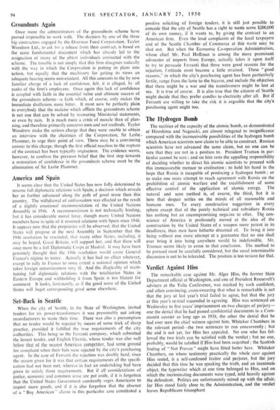Set-Back in Seattle
When the city of Seattle, in the State of Washington, invited tenders for six power-transformers it was presumably not asking manufacturers to waste their time. There was also a presumption that no tender would be rejected by means of some trick of sharp practice, provided it fulfilled the true requirements of the city authorities. This being so the Ferranti company, which submitted the lowest tender, and English Electric, whose tender was also well below that of the nearest American competitor, had some ground for complaint when their bids were rejected by the city's purchasing agent. In the case of Ferranti the rejection was doubly hard, since the reason given for it was that certain requirements of the specifi- cation had not been met, whereas in fact an undertaking had been given to satisfy those requirements. But if all considerations of justice, economy and common sense are put aside, if it is forgotten that the United States Government constantly urges Americans to import more goods, and if it is also forgotten that the absence of a "Buy American " clause in this particular case constituted a positive soliciting of foreign tenders, it is still just possible to concede that the city of Seattle has a right to waste some $200,000 of its own money, if it wants to, by giving the contract to an American firm. Even the loud complaints of the local taxpayers and of the Seattle Chamber of Commerce at this waste may be shut out. But when the Economic Co-operation Administration, whose chief Mr. Paul Hoffman is among the more prominent advocates of imports from Europe, actually takes it upon itself to try to persuade Ferranti that there were good reasons for the rejection, f3rtitude must become a little strained. These "good reasons," in which the city's purchasing agent has been particularly fertile, range from the lame to the bizarre, and include the objection that there might be a war and the transformers might be lost at sea. It is true of course. It is also true that the citizens of Seattle might decide that they prefer candles to electricity after all. But if Ferranti are willing to take the risk it is arguable that the city's purchasing agent might too.










































 Previous page
Previous page